Sep 22, 2023
Preparing for AI Search with Google Search Generative Experience (SGE)
AI in digital marketing is here to stay, and there's little doubt that the world of search marketing is on track to be turned upside down by developments in generative AI. Google's Search Generative Experience (SGE) is still in experiment phase but it's already promising to upend standard concepts and approaches to search, and consequently to digital marketing as a whole.
Google's utlimate goal is to better understand what you want, so that it can give you the perfect answer. And SGE is how it displays that answer.
To provide insights into how SGE currently works, Lindsey Schrant of Neil Patel Digital joined us to look at this new world of search.
- What is SGE?
- What does SGE look like?
- SGE query types
- The limitations of SGE
- 8 likely impacts of SGE
- 5 tips to prepare your site for SGE
Top Tip: This article was adapted from Lindsey's webinar on SGE which is available on-demand or you can listen to the podcast version.
What is SGE?
On May 10th 2023, Google announced that it was working on SGE, one of the most important visual changes to Google search engine results page (SERP) in many years. Like a highly advanced version of featured snippets, SGE uses AI to generate detailed search results that aim to give users the exact information that they’re looking for (and then some).
Note: SGE is still in beta testing phase until December 2023, and it can only be accessed in English in the United States, Japan, and India. It is not yet known when it will launch fully.
SGE in practice
So, does all this mean that SGE will replace the traditional SERP? No, there’ll still be a SERP, but it will be much more detailed. You can think of SGE as an experience, a conversation with your search engine. You can ask it detailed, conversational questions and, using AI, it will generate detailed answers. That’s the search generative experience.
What this means in practice is that you can write long conversational queries, and SGE will return detailed results, as well as links to help you conduct your own further research. In time, the search engine will better understand what you want, and it will better understand the content on the Web. This will enable SGE to answer your questions much more comprehensively than ever before.
12 Ways Digital Marketers can use ChatGPT
What does SGE look like?
What do you see when you enter a query into SGE?
The SGE response has several elements.
- Generative answer: This is the AI-generated answer to your query. Unlike the traditional SERP, it’s not a list of websites. It’s a narrative flow based on what SGE was able to find on the Internet. (In this way, it is similar to the response that displays when you type a query into ChatGPT.)
- Dropdown arrows display beside the generated text. Clicking these brings up the sources of the text, so you can assess the validity of the information.
- Website carousel: A carousel of images displays a series of links to websites that provide you with further information about your query.
- Follow-up questions: You can enter a follow-up question to dive deeper into your query.
- Follow-up suggestions: If you cannot think of any pertinent follow-up questions to ask, SGE provides a carousel of suggestions.

SGE query types
How does SGE work for different query types?
1. Informational queries
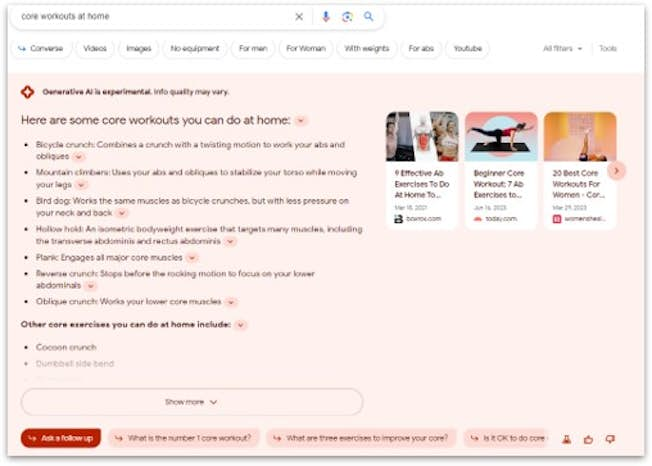
Informational queries are simply queries where the searcher is looking for facts. They may take the form of a question (“What core workouts can I do at home?”) or a more general search (“core workouts at home”).
For an informational query, SGE returns a page similar to a detailed featured snippet. The AI-generated text list (the response to your query) has the dropdown arrows linking to source websites. And the carousel displays links to other relevant websites.
Note: For informational queries, the SGE results are sometimes so detailed that searchers might not even click to further websites. All the information they need might already be on the SERP! (Don’t forget, similar concerns were raised when featured snippets were rolled out a few years ago.)
2. Commercial queries
Commercial queries are when searchers are looking to buy something. For example, “Best dry dog food for an eight-year-old Labrador retriever”.
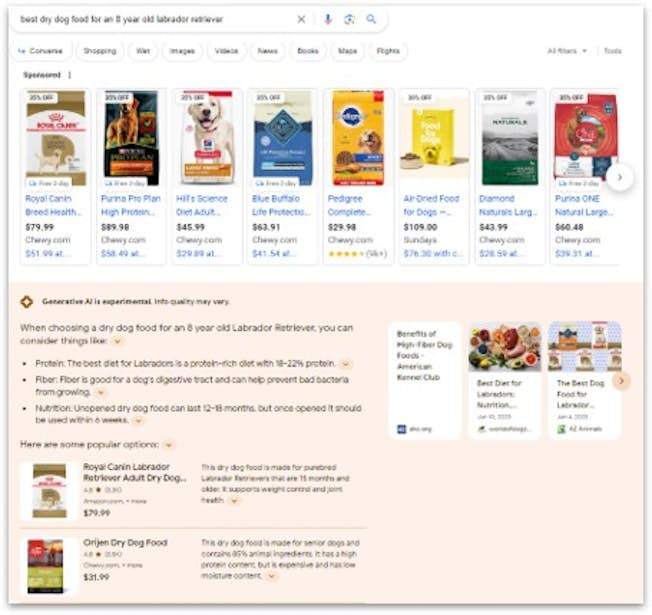
The big difference from informational queries is that, with commercial queries, paid ads display above the generated text answers. These are ads that SGE thinks are relevant to your query.
Like informational queries, you also get your text answer with dropdown links and your carousel to other websites. And it lists popular options, giving information on why these options are popular. This overview information includes information provided by brands and stores.
3. Branded commercial queries
What about branded commercial queries? These are commercial queries that include a brand. For example, “Nike running shoes”.
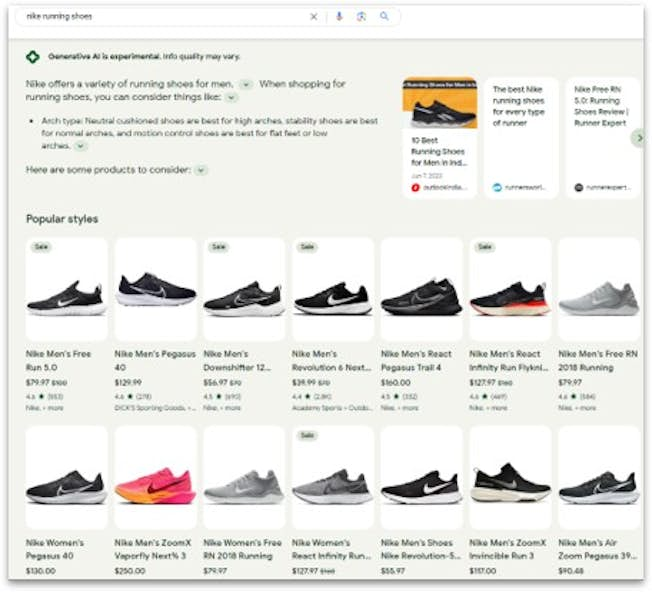
In this case, you again get an AI-generated text answer, giving you some information to consider when considering purchasing Nike running shoes. SGE also displays links to sites where you can buy Nike styles. These sites include Nike’s own website, as well as many third-party sellers.
Pro tip: Make sure your category and product pages are optimized before SGE rolls out. This will help to put you in the best position to show up in the SGE snapshot as one of the featured products.
4. Local queries
Local queries are when searchers are looking for things near them. For example, “dog boarding wichita ks”.
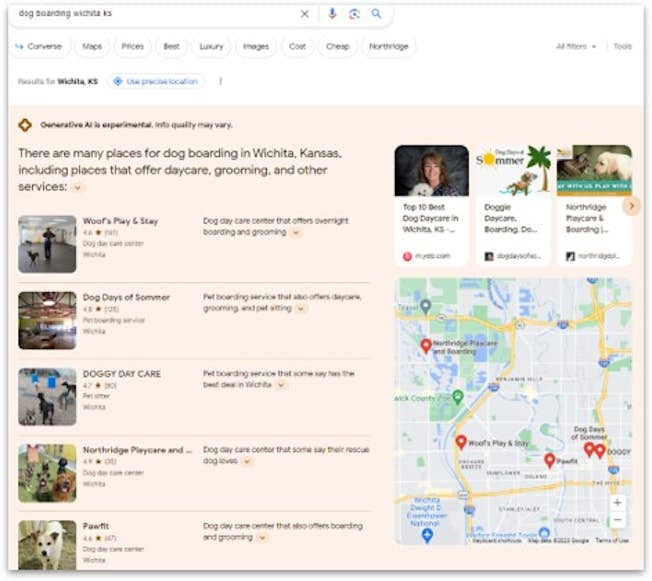
Once again, SGE returns some AI-generated information based on your query – in this case, explaining what services are offered by dog boarders in Wichita, Kansas. As well as the carousel of websites, it lists local services, along with review snippets and dropdown links to review sites. As with featured snippets, SGE also displays a map indicating where the businesses are located.
Pro tip: Reviews are going to be very important when SGE rolls out! Start gathering your customer reviews now.
Also, check out this blog for more information on local SEO.
Or link to this evergreen piece on Local SEO: https://digitalmarketinginstitute.com/blog/local-seo-for-beginners-improve-your-visibility-online-free-checklist
5. YMYL queries
YMYL queries refer to Your Money or Your Life queries. These are generally lifestyle queries where people are looking for advice (typically around health or financial issues). For example, “home remedy to treat poison ivy rash”.
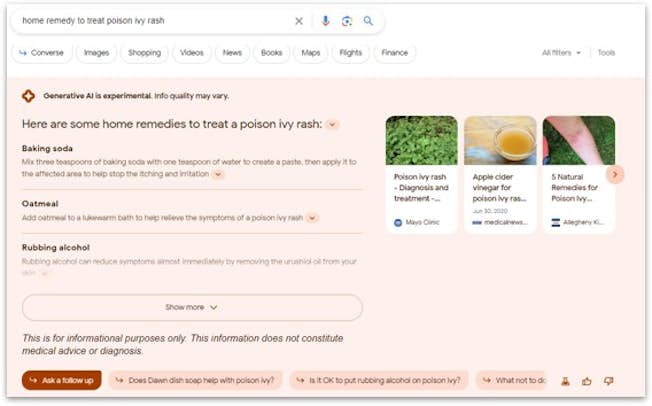
Although SGE displays the expected AI-generated text, it also contains a disclaimer: “This is for informational purposes only. This information does not constitute medical advice or diagnosis.” This is because people may decide to act based on the results they get to their YMYL queries. In some cases, Google wants people to seek medical advice instead of utilizing the SGE result. It has trained its model to add this disclaimer with these types of queries just to help protect people.
The limitations of SGE
At first glance, SGE is very powerful and impressive. However, the more familiar you become with it, the more you’ll start to realize its limitations.
Here are some notable issues:
- SGE results are not always correct. (These are known as ‘hallucinations’.) Generative AI is still in the testing phase, so it’s inevitable that it’ll make mistakes. Also, the errors in search results are sometimes reflections of errors in the web content itself. The output can only be as accurate as the input.
- Data voids: Sometimes, SGE doesn’t return any results. This may be because it doesn’t understand your query, or it may have decided that there’s no quality or reliable information available.
- Contradictions with other search results: SGE results are not always the same as results from traditional Google search. For example, the information in the organic featured snippet might differ from the AI-generated text.
- Lack of SEO data: It’s unclear what data will be shown in Google Search Console. And it’s unclear how SGE decides what thumbnails or text links to display.
“We've built in strong protections to mitigate against inaccuracies, but like all LLM-based experiences, generative AI in Search is experimental and can make mistakes… It is trained to corroborate responses with resources from the open web, but sometimes responses may reflect inaccuracies that exist on the web at large. We've launched this as an experiment in Search Labs to start, and we'll continue to improve and fine-tune the experience.” Google
8 likely impacts of SGE
It’s already becoming clear that SGE will have a significant impact on both paid search and SEO.
- Organic results pushed down the page: The SGE AI-generated text occupies a lot of valuable real estate at the top of the SERP. This pushes down the organic results, and this in turn is likely to lead to less SEO traffic.
- People not visiting websites: In some cases, the SGE text will give the searcher enough information, so (as mentioned before) they may not progress beyond the SERP. This, again, will lead to less SEO traffic. (However, any SEO traffic that does occur is likely to be more qualified. These searchers have decided to visit your website to get more information.)
- Paid ads still display at the top of the SERP: For now, it looks like paid ads will continue to display at the top of the SERP, above the AI-generated text and the organic results. This will likely continue to be the first content that searchers see on the SERP.
- Increased competition: Competition for top information results will increase. This will lead to higher levels of ranking difficulty.
- Easier to compare products: The SGE makes it easier for searchers to compare similar products. This leads to a better customer experience, but makes it harder for brands to get those conversions!
- More long-tail keywords: Searches are likely to be increasingly phrased in natural language, rather than traditional ‘search engine’ style. Websites need to be optimized to these more detailed, long-tail queries.
- Greater promotion of UGC: SGE is likely to promote user-generated content (UGC) on the SERP. This is especially the case with customer reviews.
- Metadata is still a factor: Metadata, such as your title tag and your meta description, continues to be important. After all, the title and description are what entice the searcher to click the link!
5 tips to prepare your site
Keeping these impacts in mind, how should you prepare your website for SGE?
Start preparing by following some timeless SEO tips. Google has always said that content is king, so the more quality unique content you write, the higher you’ll rank. Those who do this really well will benefit most from SGE.
Here are some top tips:
- Create content clusters.
- Encourage customer reviews.
- Ensure your schema markup is up to date.
- Write thorough, engaging content.
- Use AI-friendly formats.
Related
Upgrade to Power Membership to continue
your access to thousands of articles, toolkits, podcasts, lessons and much much more.
Become a Power Member- Login
- View Courses
- - - -
- Courses
- Resources
- - - -
- My Account
- Change Password
- Logout





